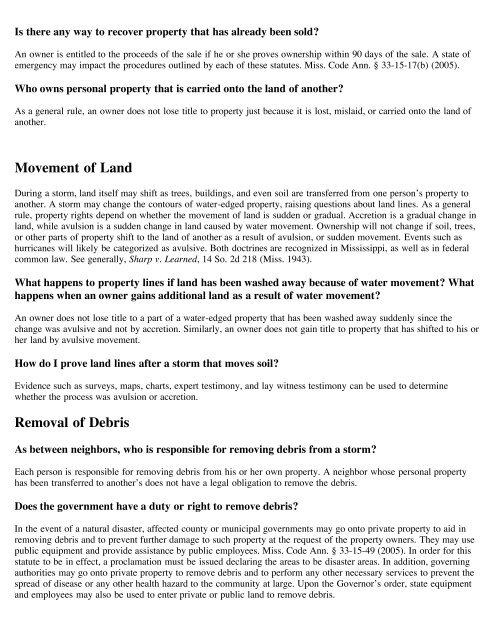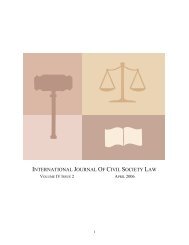Hurricane Katrina: Legal Issues - Columbus School of Law
Hurricane Katrina: Legal Issues - Columbus School of Law
Hurricane Katrina: Legal Issues - Columbus School of Law
You also want an ePaper? Increase the reach of your titles
YUMPU automatically turns print PDFs into web optimized ePapers that Google loves.
Is there any way to recover property that has already been sold?<br />
An owner is entitled to the proceeds <strong>of</strong> the sale if he or she proves ownership within 90 days <strong>of</strong> the sale. A state <strong>of</strong><br />
emergency may impact the procedures outlined by each <strong>of</strong> these statutes. Miss. Code Ann. § 33-15-17(b) (2005).<br />
Who owns personal property that is carried onto the land <strong>of</strong> another?<br />
As a general rule, an owner does not lose title to property just because it is lost, mislaid, or carried onto the land <strong>of</strong><br />
another.<br />
Movement <strong>of</strong> Land<br />
During a storm, land itself may shift as trees, buildings, and even soil are transferred from one person’s property to<br />
another. A storm may change the contours <strong>of</strong> water-edged property, raising questions about land lines. As a general<br />
rule, property rights depend on whether the movement <strong>of</strong> land is sudden or gradual. Accretion is a gradual change in<br />
land, while avulsion is a sudden change in land caused by water movement. Ownership will not change if soil, trees,<br />
or other parts <strong>of</strong> property shift to the land <strong>of</strong> another as a result <strong>of</strong> avulsion, or sudden movement. Events such as<br />
hurricanes will likely be categorized as avulsive. Both doctrines are recognized in Mississippi, as well as in federal<br />
common law. See generally, Sharp v. Learned, 14 So. 2d 218 (Miss. 1943).<br />
What happens to property lines if land has been washed away because <strong>of</strong> water movement? What<br />
happens when an owner gains additional land as a result <strong>of</strong> water movement?<br />
An owner does not lose title to a part <strong>of</strong> a water-edged property that has been washed away suddenly since the<br />
change was avulsive and not by accretion. Similarly, an owner does not gain title to property that has shifted to his or<br />
her land by avulsive movement.<br />
How do I prove land lines after a storm that moves soil?<br />
Evidence such as surveys, maps, charts, expert testimony, and lay witness testimony can be used to determine<br />
whether the process was avulsion or accretion.<br />
Removal <strong>of</strong> Debris<br />
As between neighbors, who is responsible for removing debris from a storm?<br />
Each person is responsible for removing debris from his or her own property. A neighbor whose personal property<br />
has been transferred to another’s does not have a legal obligation to remove the debris.<br />
Does the government have a duty or right to remove debris?<br />
In the event <strong>of</strong> a natural disaster, affected county or municipal governments may go onto private property to aid in<br />
removing debris and to prevent further damage to such property at the request <strong>of</strong> the property owners. They may use<br />
public equipment and provide assistance by public employees. Miss. Code Ann. § 33-15-49 (2005). In order for this<br />
statute to be in effect, a proclamation must be issued declaring the areas to be disaster areas. In addition, governing<br />
authorities may go onto private property to remove debris and to perform any other necessary services to prevent the<br />
spread <strong>of</strong> disease or any other health hazard to the community at large. Upon the Governor’s order, state equipment<br />
and employees may also be used to enter private or public land to remove debris.

















